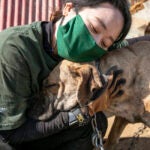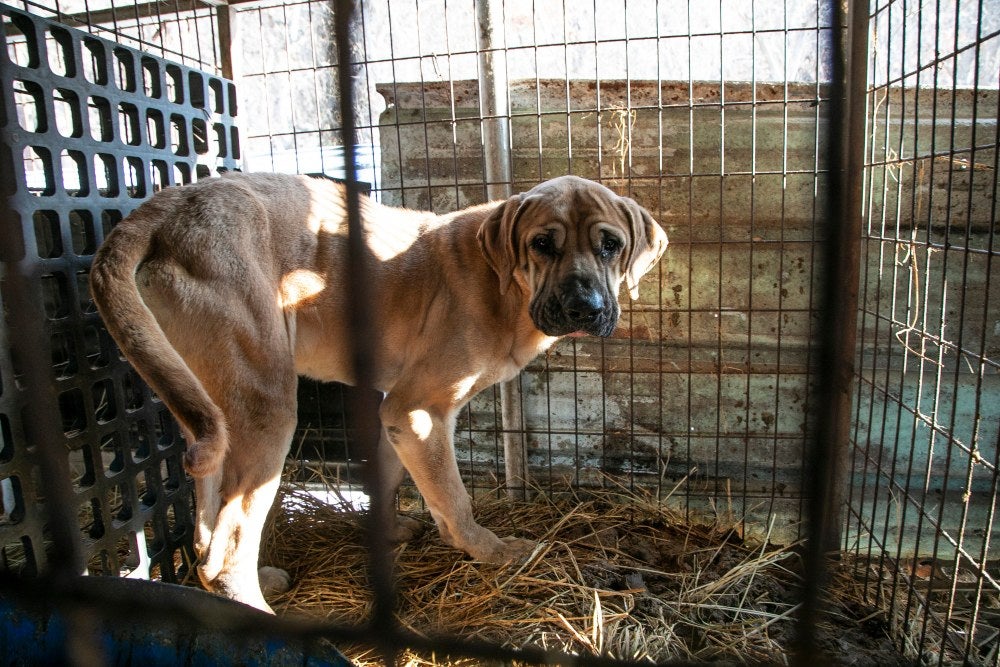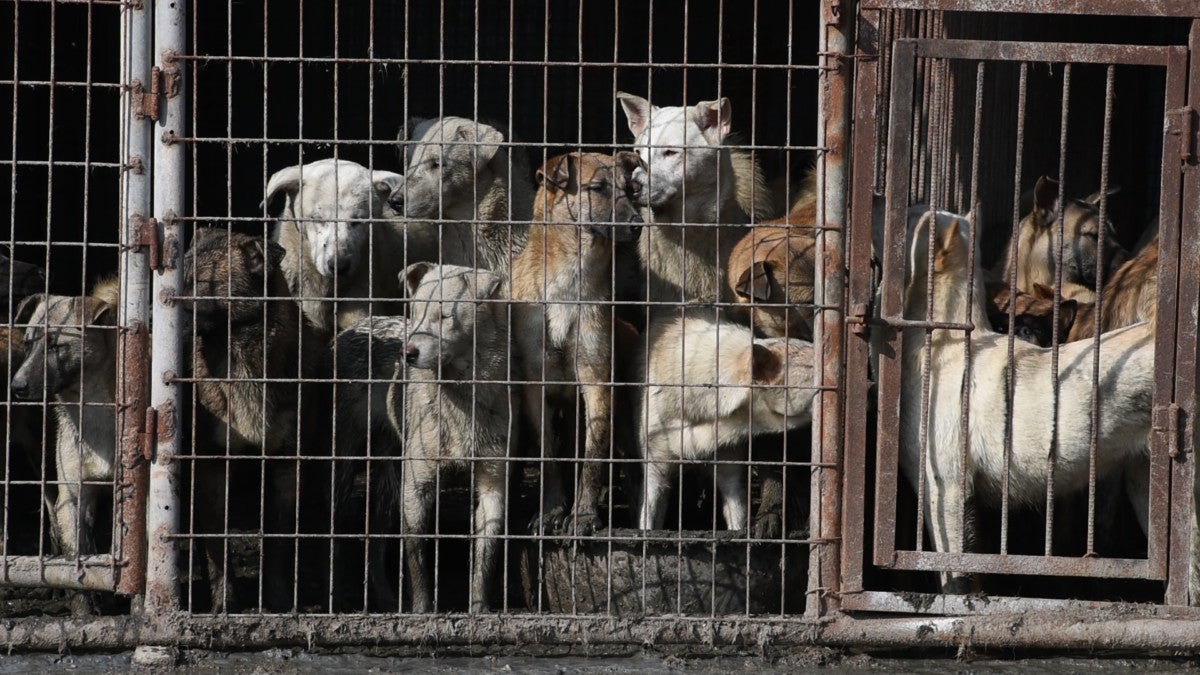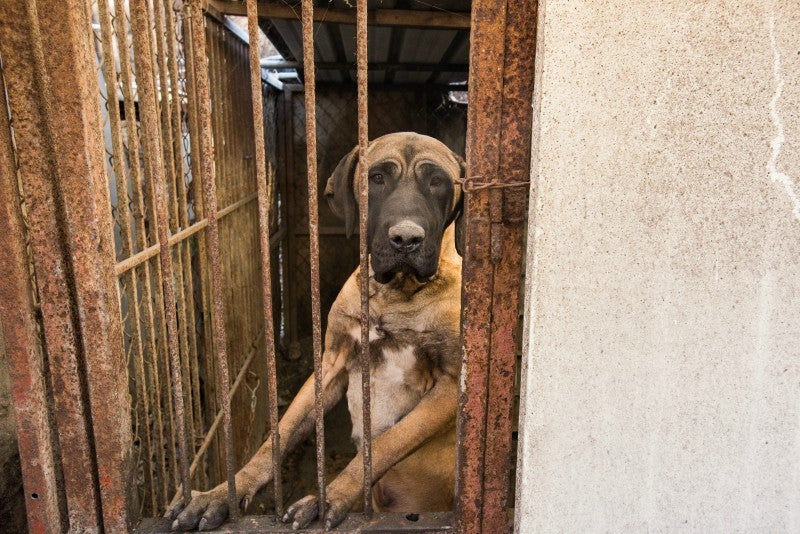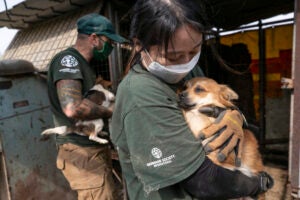
CHANTILLY, Va.—Some 196 dogs saved from South Korea’s brutal dog meat trade touched down in the United States to start their search for loving homes, thanks to a rescue mission by Humane Society International. Due to COVID-19 safety precautions, the rescue effort saw HSI’s U.S. team quarantine for two weeks at a government-sanctioned hotel in Seoul before being allowed to head to a dog meat farm in Haemi to rescue the dogs, which include golden retrievers, a poodle, Korean jindos and mastiffs, Pomeranians, terriers and a Labrador.
Most of the dogs will be provided shelter in the DC area, either directly with local DC-area animal shelters or at a temporary shelter run by HSI and the Animal Rescue Team of the Humane Society of the United States, with assistance from RedRover. The remaining dogs will be taken to our HSI/ Canada temporary shelter in Montreal before placement with local shelter partners there. All the dogs will be evaluated, receive the veterinary treatment needed, and be in warm beds with nutritious food for the first time in their lives. The dogs staying in the HSI/HSUS temporary shelter will gradually move to shelter partners across the US over the coming month.
Organizations taking in the rescued dogs are:
- SPCA Cincinnati (Cincinnati, Ohio)
- Delaware Valley Golden Retriever Rescue (Reinholds, Pennsylvania)
- Humane Society of Calvert County (Sunderland, Maryland)
- Homeward Trails Animal Rescue (Fairfax Station, Virginia)
- Petey and Furends (Rockville, Maryland)
Of the 196 dogs, 170 were rescued by HSI from a single dog meat farm closed down by the charity in partnership with the farmer. The other 26 dogs had been rescued by HSI from previous dog meat market and farm rescue operations but had not been able to leave their South Korean temporary shelter until now due to COVID-19 travel restrictions. Dog adoption is not yet widely accepted in South Korea, however HSI hopes that its work to raise awareness about the benefits of adoption and promotion of its adoption success stories overseas, will gradually lead to more dogs finding forever families within the country.
This marks the 17th dog meat farm that HSI has permanently closed down, and coincides with the publication of a new opinion poll showing growing support in South Korea for a ban on dog meat consumption. The poll, conducted by Nielsen and commission by Humane Society International/Korea, shows that 84% of the population say they don’t or won’t eat dog, and almost 60% support a legislative ban on the trade.
Key poll findings
- 84% of South Koreans haven’t consumed dog meat or say they are not willing to consume it in the future.
- 59% of South Koreans support banning dog meat, an increase of 24% from 2017, with opposition to a ban at an all-time low (fewer than half (41%) of the population.
- 57% of South Koreans believe dog meat consumption reflects poorly on Korea, increasing from 37% in 2017.
Kelly O’Meara, HSI’s vice president of companion animal campaigns, says: “Although most people in South Korea don’t regularly eat dog meat, and support for a ban is growing, there remain thousands of farms of all sizes across the country where dogs of all breeds endure a harsh existence. With fewer people wanting to eat dog, farmers can see the writing is on the wall for this dying industry and so they work with HSI to find a solution that gives both them and their remaining dogs a chance of a new life. With such interest from dog farmers, and public support, we hope the Korean government will adopt this type of approach to phase out the dog meat industry for good.”
Once a taboo subject, the suffering of dogs and the unsanitary conditions on meat farms has received far greater visibility on South Korean media in recent times, contributing to rising support for a dog meat ban. The efforts of local Korean animal welfare groups and Humane Society International’s campaign, including dog farm closures which have been featured on prime time Korean TV and national news, have been instrumental in shining a spotlight on this cruel industry.
South Korea is the only country that intensively farms dogs for human consumption on a large scale. An estimated 2 million dogs a year are reared on thousands of dog meat farms across the country. The conditions on these farms are horrific – most dogs live their entire lives in barren wire cages or tethered on short chains, deprived of veterinary care or adequate protection from the punishing heat of summer and biting cold of winter, until they are brutally slaughtered, usually by electrocution or hanging.
Most South Koreans do not consume dog meat, and many citizens increasingly see dogs only as companion animals. The increase in companionship with dogs, particularly among younger Koreans, has at the same time fostered a greater interest in animal welfare and a decline in acceptance of eating dog meat. With reduced dog meat sales, HSI’s pioneering program works with dog farmers eager to exit this dying industry. HSI permanently closes down their farms, rescues their dogs and transitions the farmers to more humane and profitable livelihoods. The farmers sign a 20-year contract, stipulating they will not breed dogs or any animals, and the cages are demolished to ensure that no animals will suffer on the property in future.
Nara Kim, HSI/Korea’s dog meat campaign manager, says: “Every dog meat farm I’ve visited has a horrible stench of faeces and rotting food, but there was something different about this dog farm, it had a smell of death. The conditions were truly pitiful, and when we found these dogs they had looks of utter despair on their faces that will haunt us forever. Many of them are covered in painful sores and wounds from neglect, some have inflamed eyes and peer out blindly from their cage. I feel grateful they can no longer see this horrible place they live in, and when they finally receive veterinary care and can open their eyes, they will never have to endure this hopelessness again.”
Facts:
- Recent crackdowns by authorities to curb the dog meat industry include the shutting down of Taepyeong dog slaughterhouse (the country’s largest) by Seongnam City Council in November 2018, followed in July 2019 by the closure of Gupo dog meat market in Busan (South Korea’s second largest dog meat market after Moran market, which has also closed), and a declaration in October last year by the mayor of Seoul that the city is “dog slaughter free”. In November 2019 a court found that a dog farmer who electrocuted dogs was in violation of the Animal Protection Act, a judgement that could have huge implications for an industry that relies almost entirely on electrocution as a killing method.
- At each dog meat farm closure, HSI has a veterinarian test for the presence of the H3N2 virus (“canine influenza”), at the time the dogs receive their rabies, DHPP and coronavirus vaccines. HSI also vaccinates the dogs for distemper and parvo. HSI then quarantines the dogs on the farm or at a shelter for at least 30 days, and the dogs are health certified again prior to transport overseas.
Download b-roll video and photos of the rescue
ENDS
Media contacts:
- Kirsten Peek, United States: kpeek@humanesociety.org, 202.744.3875
- Wendy Higgins, United Kingdom: whiggins@hsi.org, +44 (0)7989 972 423
- Nara Kim, South Korea: nkim@hsi.org
Nielsen online research conducted August/September 2020. Total sample size 1,000 people across six major cities in South Korea (Busan, Daegu, Incheon, Gwangju, Daejeon, Ulsan) weighted and representative of South Korean adults (aged 18+).

